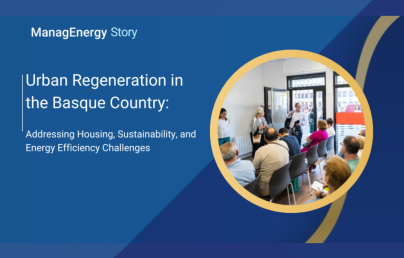
Efficient Buildings Europe launches webinar series on EPBD implementation

Efficient Buildings Europe launches webinar series on EPBD implementation
Efficient Buildings Europe’s webinar explored how National Building Renovation Plans (NBRPs) drive the EU’s decarbonisation goals, highlighting key strategies, financial tools, and real-world success stories.
On February 6, 2025, Efficient Buildings Europe launched its webinar series on the implementation of the Energy Performance of Buildings Directive (EPBD), with a focus on National Building Renovation Plans (NBRPs).
These plans serve as the primary planning tool for Member States, guiding the strategic direction and implementation of building renovations. They require detailed outlines of renovation trajectories, the specific measures to be employed, and the financial tools and resources dedicated to achieving these goals.
The event sparked lively discussions on the framework, objectives, and challenges of these plans in the broader context of the EU’s climate goals.
National Building Renovation Plans: From strategy to action and practical insights
The webinar opened with a clear message: achieving the EU’s building decarbonisation targets by 2050 requires robust, well-coordinated NBRPs. The European Commission also presented the EPBD recast, emphasising four pillars: renovation, decarbonisation, enabling frameworks, and modernisation. From introducing zero-emission building standards to enhancing energy performance certificates, the recast sets the stage for a greener, more efficient building sector.
Practical guidance on NBRP preparation was shared, highlighting the importance of stable policies and the energy efficiency first principle. The discussion stressed that financial tools must align with renovation goals, as long-term success depends on predictable, supportive frameworks.
Spain’s participatory process served as an inspiring case study. By involving diverse stakeholders through working groups and roundtables, Spain demonstrates how inclusive dialogue fosters stronger, more actionable plans.
Lessons learned from different sectors and stakeholders
The conversation shifted to the transformative power of data. Digital tools are becoming indispensable for planning, monitoring, and optimising renovation efforts. Building managers can track energy use, automate systems for efficiency, and ultimately reduce carbon footprints with greater precision.
The commercial real estate sector added another layer of insight, highlighting the potential of green financing mechanisms. Aligning regulatory frameworks with sustainability goals can unlock new investment streams, accelerating renovation across Europe.
France’s experiences in residential building renovation revealed key takeaways: consistent funding, clear regulations, and strong stakeholder engagement are essential. The importance of long-term visibility for financial support emerged as a recurring theme, with a call for multi-annual funding scenarios that provide certainty to homeowners and investors alike.
Local-level planning for heating and cooling strategies was also in the spotlight. Cities across Europe are adopting neighbourhood-based approaches to maximise efficiency and integrate renewable energy sources. Access to building performance data remains a critical enabler for municipalities seeking to implement these strategies effectively.
What’s next?
Efficient Buildings Europe reaffirmed its commitment to supporting EPBD implementation through ongoing dialogue and shared best practices.
This engaging and informative event set the tone for future webinars, which will continue to explore the essential components of the Energy Performance Building Directive. The next webinar will focus on minimum energy performance standards (MEPS).

